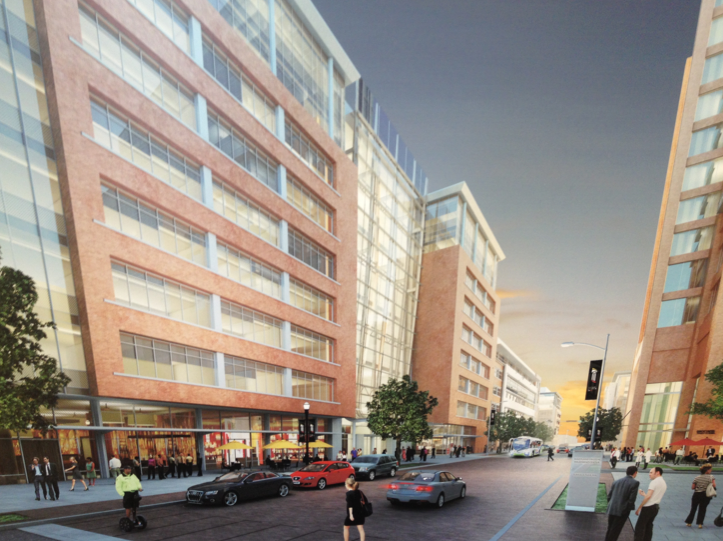In late 2003, a contingent from the University of Maryland visited then Mayor Martin O’Malley with a photo of the blighted intersection of Baltimore Street and Fremont Avenue and a plan. Now it’s the heart of a growing 12-acre research campus.
The University of Maryland BioPark, led by Jane Shaab, who helped spin out gb.tc from the Greater Baltimore Committee, has already grown into one of the major hubs of innovation in the region, but Shaab has bigger plans.
“There is no reason the academic and research strengths we have here at the university shouldn’t create an environment of accelerated growth for this part of the city,” said Shaab this summer in a conference room at 801 W. Baltimore Street, the BioPark’s primary campus building to date. From the glass windows, she looked out onto three construction sites, a parking lot aimed at development and helmeted workers.
“It’s thrilling to think about what has changed,” she said. “And what still is to come.”

Within a few years time, construction at 873 W. Baltimore St. will be a new 200,000-square-foot multi-tenant building — housing more biotech startups and a new incubator — the third of its kind at the BioPark on Baltimore’s west side.
It all started with a photo, depicted at the top of this article, taken by a University of Maryland staffer from a campus building. Many of the vacant lots in view were city owned, some were abandoned. With that single photo and a strong case from Shaab and others, O’Malley was sold on the project’s merit.
“He immediately got on the phone and began connecting the dots,” said Shaab, who herself is seen as having helped push forward the effort.
When she’s mentioned to many established members of the technology community, she’s considered a connector, someone who is fully entrenched in the region’s institutional world but still curious about the small changes afoot here.
Now the Baltimore Street corridor — yes, the blighted street from a decade ago is slowly becoming a corridor — is aimed at becoming a bold boulevard leading from the University of Maryland campus across Martin Luther King Boulevard toward a gentrifying Hollins Market neighborhood.
There are plans for mixed used, multi-story buildings, a hotel and expanded homes for research, the kind of research that can spin out companies that attract millions of dollars of funding with bold visions.
“That changes a city,” she said.







